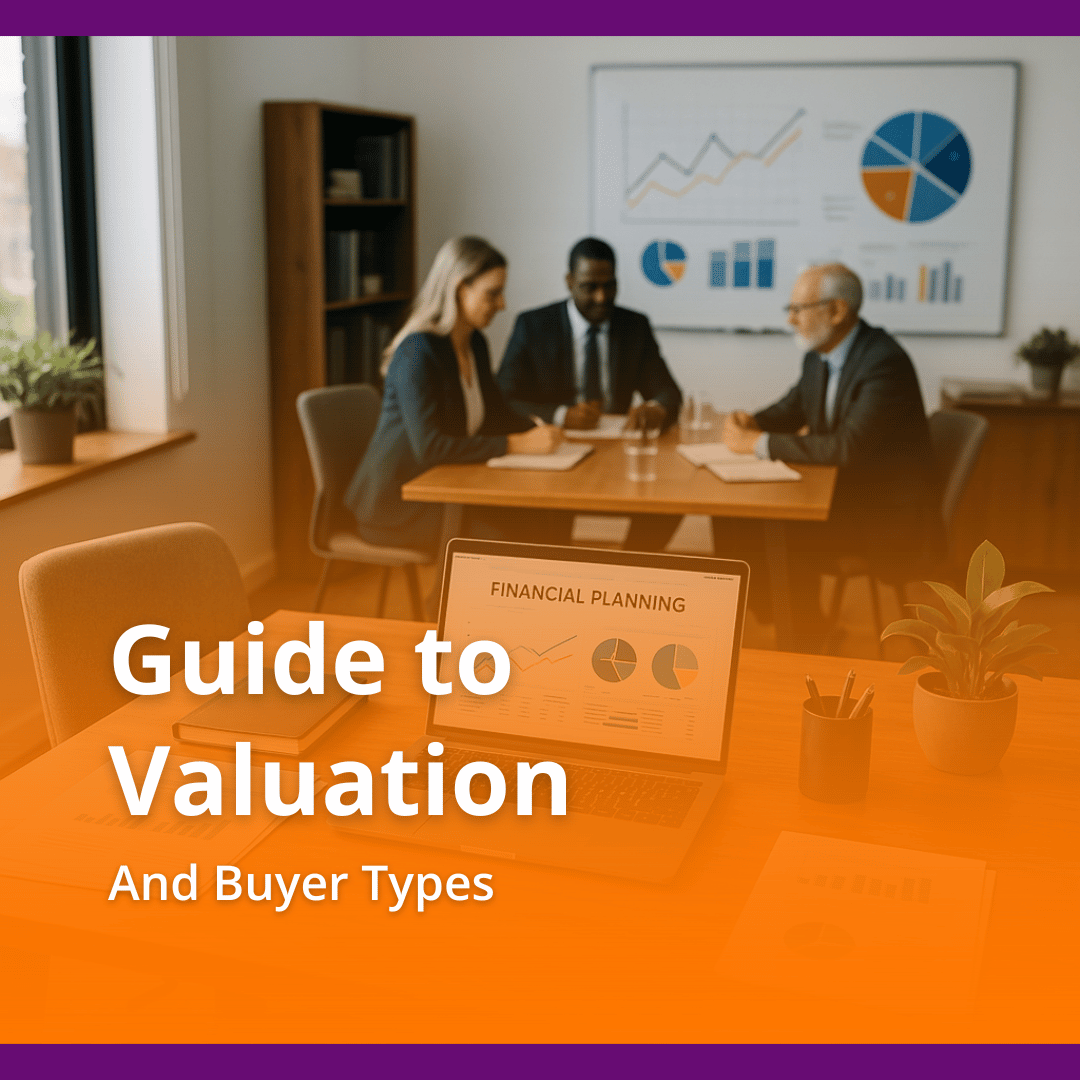How to Know If You’re Emotionally Ready to Sell Your Advisory Practice
You have pictured the day you sell your advisory practice. The deal closes. The pressure lifts.
Comprehensive, data-driven valuations and comparative equity analyses to accurately price your practice, establish market benchmarks, and support informed decision-making.
Comprehensive M&A guidance encompassing deal structuring, negotiation strategies, market listings, and transaction closings.
Comprehensive systems, targeted coaching, and in-depth assessments designed to optimize operational efficiency and enhance advisory team effectiveness.
Strengthen continuity through the implementation of formal continuity agreements, the establishment of legal entities, execution of enforceable legal contracts, and securing appropriate capital resources.
9 min read
 Anthony Whitbeck, CFP®, CLU®
June 30, 2025
Anthony Whitbeck, CFP®, CLU®
June 30, 2025

What kind of buyer will protect the financial advisory business you built and pay what your book of business is worth?
Nearly 40% of financial advisors are expected to retire within the next decade. That wave of exits will flood the marketplace with many advisors looking to sell their practice, intensifying competition and raising the stakes. For any financial advisor planning an exit, selecting the right buyer is crucial to protecting the value of your financial advisory business and ensuring the future of your clients and staff.
A strategic buyer may offer a clean break and a larger upfront check, but a financial buyer might give you a second payout and a role in the firm’s direction. Knowing how each potential buyer approaches valuation, integration, and legacy enables you to sell your practice with confidence. This guide unpacks what’s at stake, how a practice valuation works, and provides tips for advisors on aligning their sale strategy with their goals to maximize value when selling their financial advisory practice.
Selling your financial planning practice affects every part of your business and personal life. It’s a decision that involves transferring responsibility for your client base, your team, and the business value you've built. A well-structured sale allows you to step away with clarity, knowing the advisory firm will continue to deliver the quality financial advice your clients expect. Understanding what’s involved helps financial advisors approach the process with purpose and avoid costly missteps when it comes to selling.
Selling a financial advisory business requires both personal preparation and operational control from the business owner. You need to think through what comes after the sale, while also managing everything within the business today. This includes preparing your client relationships for the transition and ensuring the quality of financial advice remains high. Your team will also need stability. A clear succession plan is critical; it supports the staff, preserves client relationships, and is fundamental to maintaining the value of your financial planning practice through the acquisition. This level of strategic planning is essential for any business owner.
Timing plays a direct role in your practice’s true value and the sale terms you’ll be offered. A potential buyer will look closely at growth metrics, client demographics, and the strength of your cash flow. If your client base skews younger and AUM is trending upward, your advisory practice will likely attract stronger interest. Performance data and up-to-date financial records tell part of the story, but your own readiness matters as well. Many advisors wait until external pressures force their hand. Others start planning early, when their advisory firm is operating efficiently and market conditions support a strong practice valuation. The right time to sell your practice is when both the business and the owner are in a position to make clear, forward-looking decisions.
Many financial advisors sell as they are ready to retire, looking to exit the financial services industry on their terms. Others are responding to different pressures. Some want to realize the business value they’ve built while market conditions are favorable. Others want to step back from the administrative burdens of running an advisory practice. Regardless of the reason, planning an exit helps you manage the sale intentionally. It puts you in a position to evaluate each potential buyer, protect the value of your business, and ensure your clients and staff are supported. Advisors who prepare in advance are better equipped to structure a deal that reflects the strength of their financial advisory firm.
Before speaking with any buyer, you need a clear, supportable answer to one question: What is my business worth? A professional practice valuation provides the answer using structured, data-driven methods. The valuation of your business assesses the financial health of your advisory practice and identifies where value is concentrated, specifically in client relationships, recurring revenue, and operational consistency. This valuation process anchors your pricing expectations, arms you for negotiation, and helps you evaluate which offers reflect the actual market value of your book of business. Understanding the current value of your practice is the first step to help you maximize its value in a sale.
Revenue and EBITDA multiples are two common valuation methods used in valuing an advisory practice. A revenue multiple offers a quick baseline, but it doesn’t account for operating costs. Buyers often rely more heavily on EBITDA—Earnings Before Interest, Taxes, Depreciation, and Amortization—because it provides a cleaner measure of profitability and cash flow. EBITDA indicates how effectively your business converts revenue into earnings, serving as a key indicator of financial health. Understanding how these metrics determine your business value is crucial when you prepare to sell your book of business.
For a more comprehensive analysis, a valuation expert will employ additional methods, such as the Discounted Cash Flow (DCF) and comparable sales analysis. A DCF model projects the future cash flow of your advisory business and discounts those projections to present value, giving a forward-looking view of what your company can generate. This model is beneficial when your firm is still in growth mode. Comparable sales, or comps, provide insight into what similar financial advisory practices have sold for in the current market. These benchmarks help validate your asking price. When used together, these common valuation methods provide a well-supported picture of your practice’s worth and its perceived value. How a potential buyer interprets this valuation depends entirely on whether they are a strategic or financial buyer.
A strategic buyer is seeking to expand by acquiring an advisory practice that complements their existing business. They view your firm not only for its financials but for how it fits their infrastructure and expands their reach. This buyer evaluates your location, team, and client base as part of a broader expansion strategy. Learning their priorities allows you to position your financial advisory practice as a valuable acquisition target.
Strategic buyers are other firms operating in the financial advisory industry. These may include regional or national advisory businesses or competitors seeking to strengthen a niche service. Unlike investors, their primary objective is to acquire practices that create synergy, gaining scale and access to new client relationships. Strategic buyers aim to integrate your business into their own to expand their presence in the financial services sector and improve long-term performance.
Strategic buyers prioritize expansion and operational efficiency. Their goal in an acquisition is to acquire a practice that brings immediate value through your book of business, while reducing costs by consolidating operations. Many aim to strengthen their brand and retain talent. These buyers see your practice as a way to grow faster than building from the ground up, and they are often focused on long-term business development.
Selling your financial advisory firm to a strategic buyer comes with distinct benefits. Because they view your practice as an operational fit, they may offer a higher purchase price and an all-cash offer. This can result in a swift and seamless exit for the seller. Their existing leadership structure often absorbs the new team, offering career opportunities for your staff. For many financial advisors who are ready to retire, this structure offers both a high business value and clarity.
The process with a strategic buyer can be complex. Due diligence is often extensive, including a review of your firm’s systems, compliance protocols, and company culture. A poor cultural match between firms can affect retention rates and client satisfaction. Your brand identity may also be phased out. If your financial planning practice has a strong local presence, it’s essential to evaluate how much of that will remain after the sale. The right strategic buyer aligns not only with business metrics but also with how clients and staff are treated.
Rather than seeking integration, a financial buyer approaches your advisory practice with a different objective—they evaluate your firm as a growth-focused investment. Their interest is tied to return on capital and the ability to improve performance, scale operations, and later sell the business at a higher value.
A financial buyer is not another advisory firm but an investor group. These include private equity firms or family offices looking to expand in the financial services industry. Their focus is on acquiring practices that have solid fundamentals and room to grow. They rely on business valuation models and cash flow projections to assess whether a firm is positioned to grow under their ownership. Their involvement often brings new resources and capital to a financial advisory business.
Financial buyers typically follow a hold-and-grow strategy. They acquire a practice, stay involved for three to seven years, and make strategic investments to increase their business value. This capital may be allocated toward hiring, acquiring additional client books, or implementing new technology. This approach is designed to build your business and enhance the firm’s value ahead of a future sale.
One of the most appealing aspects of selling to a financial buyer is the opportunity to remain involved in the business. These buyers often prefer the seller to retain partial ownership and continue in a leadership role. This allows you to participate in future gains. For advisors who are not yet ready to retire, this path offers a way to reduce some equity while maintaining an active role in the practice's growth. It’s a way to continue shaping the firm's direction with added capital.
Staying involved changes the nature of your role. Financial buyers typically offer lower upfront payments. Their offers often include performance-based components such as earn-outs, which are tied to post-sale growth targets. Your total payout depends on meeting these metrics, and you will be accountable to new partners who closely track financial performance. This structure can be a challenge for advisors who are accustomed to making independent decisions.
The right buyer for your financial advisory practice depends on what you want from your exit. There is no single best answer, only the best answer for your financial advisor business. This table breaks down the key differences.
| Criteria | Strategic Buyer | Financial Buyer |
|---|---|---|
| Buyer Type | An operating firm in the financial services industry. | An investor group, such as a private equity firm. |
| Focus | Long-term growth, operational synergy, and market expansion. | A strong return on capital over a defined holding period. |
| Typical Involvement | Full integration of the practice into their existing operations. | Hands-off management or an advisory role with the seller. |
| Seller Role | The seller usually exits completely and quickly after a transition period. | The seller often stays involved, sometimes retaining an equity stake. |
| Deal Timeline | Generally slower due to comprehensive due diligence and integration planning. | Often faster, with a focus on financial metrics and deal structure. |
| Payout | Typically a higher, all-cash offer upfront due to strategic value. | A structured payout, often with earn-outs and seller financing. |
| Best For | Advisors seeking a clean and complete exit with a maximum upfront price. | Advisors who want to stay involved and benefit from future growth. |
How you sell matters just as much as who you sell to. Taking your practice to the open market with an experienced advisor creates a competitive environment. Data shows that this process can increase a practice’s value by 20% to 46% compared to a private, off-market deal. Competition forces every potential buyer to put their best foot forward.
The decision to sell your financial advisory practice should be grounded in clear priorities. What you want from the sale—retirement, continuity, or expansion—will determine which buyer type is the right fit. Without clarity, it’s easy to select a buyer who aligns with the transaction but not with your longer-term goals.
Advisors ready to retire with no ongoing responsibilities often benefit from selling to a strategic buyer. These buyers are designed to absorb new operations. This path enables you to exit your advisory firm after a structured handoff and receive a defined payout. For financial professionals who are ready to move forward, this type of transaction provides closure.
Remaining active after the sale appeals to many financial advisors. Financial buyers often favor a structure where the seller retains partial equity and remains engaged in leadership. This supports continuity. You gain liquidity today while staying involved in business development and long-term strategic planning. It’s a common choice for advisors who are not yet ready to retire and want to participate in future value creation.
The future of your team and clients depends on cultural alignment. A strategic buyer that shares your values and service philosophy is more likely to preserve your advisory firm’s strengths. Staff retention and client satisfaction rely on shared expectations. Evaluating how a buyer plans to integrate your advisory firm can reveal how well they understand the culture you've built.
For advisors seeking expansion with added resources, a financial buyer provides the structure to scale. These buyers introduce systems, capital, and strategic planning frameworks designed to increase revenue or pursue acquisitions. Instead of stepping away, you continue building with new backing. This approach is particularly effective for business owners seeking to grow faster and more efficiently.
Selling your financial advisory business requires careful planning, effective positioning, and a well-defined strategy. The first step in any successful exit plan is understanding your numbers. Our free practice valuation calculator gives you a powerful, data-driven estimate in minutes. Know the potential worth of a financial advisory practice like yours and empower your strategic planning with a solid foundation.
To truly prepare for a sale and defend your asking price, a comprehensive valuation from an expert is the next critical step. Professional deal support will not only verify your valuation but will help you maximize the value of your practice through effective negotiation and buyer vetting.
Once you decide to sell your financial planning practice, every move will shape the outcome. A rushed process or the wrong buyer can undercut the value you spent years building. This business strategy requires precision across valuation, buyer selection, and negotiation. Advisors who start planning with a structured approach consistently close stronger deals and exit on their terms.
Advisor Legacy works directly with financial advisors to prepare for selling and to sell their practices with confidence. We provide comprehensive practice valuations based on real market data, help develop your succession plan, and guide you through each step of the transaction. Our team helps position your firm for a structured sale that protects your client base, supports your staff, and reflects the full value of your advisory business. Sellers who take their practice to market with experienced advisory support often receive significantly stronger offers. Our goal is to ensure the sale accurately reflects everything you’ve built.
Let us help evaluate, prepare, and guide you through the critical stages of selling your business with clarity and leverage. Our strategies are built around your goals and achieving the full value of your practice. Schedule your call with Advisor Legacy and put the right plan in motion.
Anthony "Tony" Whitbeck, CFP®, CLU®, is CEO and Owner of Advisor Legacy. He began his career as a financial advisor in 1989 and later shifted to coaching, where he’s guided more than two hundred advisory practices through growth, valuation, and succession. Tony leads Advisor Legacy’s certified third-party valuation engagements and coordinates lending and legal partners to streamline transactions. His articles focus on building transferable enterprise value, mapping internal vs. external exits, and avoiding common succession pitfalls. Drawing on decades of in-the-trenches experience, Tony provides practical, compliance-friendly guidance advisors can use right away.
Receive timely articles, tip sheets, events, and more right in your inbox.

You have pictured the day you sell your advisory practice. The deal closes. The pressure lifts.

Selling a company is often the largest financial event of a business owner’s life. Yet most exit conversations still revolve around valuation and...

Are you preparing to sell your business with a team you want to keep intact? Then you’re already thinking ahead. The moment a sale is in motion, your...